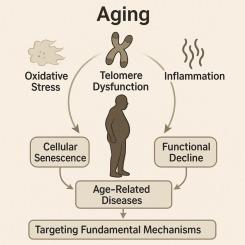Telomere-targeted medicine: Bridging molecular mechanisms and clinical applications in age-related diseases
IF 5.1
2区 医学
Q1 MEDICINE, RESEARCH & EXPERIMENTAL
引用次数: 0
Abstract
Telomeres, the nucleoprotein structures at the ends of chromosomes, have emerged as critical regulators of cellular aging and key contributors to the pathogenesis of age-related diseases. This comprehensive review examines the evolution of telomere biology from fundamental research to therapeutic applications, analyzing molecular mechanisms of telomere dysfunction across diverse disease categories, including autoimmune disorders, cardiovascular diseases, neurodegeneration, respiratory diseases, metabolic disorders, chronic kidney disease, cancer, and premature aging syndromes. We explore current therapeutic strategies ranging from telomerase modulation to senolytic approaches, highlighting emerging technologies in drug discovery, including CRISPR-based interventions, nanomedicine, mRNA-based therapies, partial cellular reprogramming, and artificial intelligence applications. The convergence of mechanistic understanding with innovative therapeutic approaches positions telomere biology as a promising frontier for addressing multiple age-related conditions simultaneously, potentially shifting medicine from reactive disease treatment toward proactive aging-focused prevention. However, significant challenges remain, including safety considerations, biomarker development, and establishing regulatory frameworks for aging-targeted therapeutics. The success of telomere-targeted interventions could herald a paradigm shift toward geroscience-based medicine, extending lifespan and health span by targeting fundamental biological aging processes.

端粒靶向药物:桥接分子机制及其在衰老相关疾病中的临床应用
端粒,染色体末端的核蛋白结构,已经成为细胞衰老的关键调节因子和与年龄相关疾病的发病机制的关键贡献者。本文全面回顾了端粒生物学从基础研究到治疗应用的演变,分析了端粒功能障碍的分子机制,包括自身免疫性疾病、心血管疾病、神经退行性疾病、呼吸系统疾病、代谢疾病、慢性肾病、癌症和早衰综合征。我们探讨了当前的治疗策略,从端粒酶调节到衰老方法,重点介绍了药物发现中的新兴技术,包括基于crispr的干预、纳米医学、基于mrna的治疗、部分细胞重编程和人工智能应用。机制理解与创新治疗方法的融合使端粒生物学成为同时解决多种与年龄相关疾病的有前途的前沿,有可能将医学从反应性疾病治疗转向主动的以衰老为重点的预防。然而,重大的挑战仍然存在,包括安全性考虑,生物标志物的开发,以及建立针对衰老的治疗的监管框架。端粒靶向干预的成功可能预示着以老年医学为基础的范式转变,通过靶向基本的生物衰老过程来延长寿命和健康寿命。
本文章由计算机程序翻译,如有差异,请以英文原文为准。
求助全文
约1分钟内获得全文
求助全文
来源期刊

Life sciences
医学-药学
CiteScore
12.20
自引率
1.60%
发文量
841
审稿时长
6 months
期刊介绍:
Life Sciences is an international journal publishing articles that emphasize the molecular, cellular, and functional basis of therapy. The journal emphasizes the understanding of mechanism that is relevant to all aspects of human disease and translation to patients. All articles are rigorously reviewed.
The Journal favors publication of full-length papers where modern scientific technologies are used to explain molecular, cellular and physiological mechanisms. Articles that merely report observations are rarely accepted. Recommendations from the Declaration of Helsinki or NIH guidelines for care and use of laboratory animals must be adhered to. Articles should be written at a level accessible to readers who are non-specialists in the topic of the article themselves, but who are interested in the research. The Journal welcomes reviews on topics of wide interest to investigators in the life sciences. We particularly encourage submission of brief, focused reviews containing high-quality artwork and require the use of mechanistic summary diagrams.
 求助内容:
求助内容: 应助结果提醒方式:
应助结果提醒方式:


